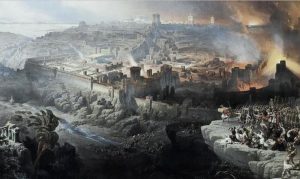In recent decades the subject of hell lost quite a lot of popularity. Even among Christians, where seems to be one of the major doctrines, only about half believe in its existence.

My previous post points out that the theory of hell is far from logical, but logic is not the main principle of Christianity (I know, it sounds bad, but I don’t mean it in a bad way – if God Almighty showed up and told me to do something against my logical thinking, I’d most probably do it).
In other words, just because I don’t understand something doesn’t give me a reason to refute it.
The principle of Christianity is…
The Bible.
Without beating around the bush I’ll say what I believe – the Bible doesn’t say a word about hell.
Some will disagree right away – they have Bibles and it does say, “Hell” in many places.
First of all, if your Bible says, “Hell” there’s a big chance it’s a pretty old translation. Most Bibles sold today doesn’t have this word or has it just a handful of times in the Bible.
But he knoweth not that the dead are there; and that her guests are in the depths of hell. (Proverbs 9:18., KJV)
But he knoweth not that the dead are there;
That her guests are in the depths of Sheol (Proverbs 9:18 ASV)
We need to look a little into the original words used in the Bible and don’t worry, you don’t need to be an expert to get it.
Some translations have the word hell over 40 times so before we go on we need to add one detail – we’re not wondering if the word “hell” is in the Bible, because in some translations it clearly is; we wonder if the Bible says anything about hell that is… Christian… …which is a place that has 2 characteristic features:
-
is a punishment
-
has no end
In the original languages of the Bible there are only 3 words that are translated into hell, one in the Old Testament, 2 in New. Simple!
SHEOL/HADES
Sheol equals hades, every time the Bible was translated from Hebrew to Greek hades replaced sheol (compare Psalms 16:10 and Acts 2:31). We can find sheol 64 times and hades 11. They aren’t popular words then, let’s compare them to Lord (8,000 times) or “earth” or “town” (1,000 each).
The problem is the Bible never defines these words and we need to investigate how they are used. When we look at all sheol/hades examples we clearly see that the place isn’t any punishment, it’s somewhere people “go” after they die. “Go” isn’t literal, the Bible doesn’t specify if they actually go, or are thrown there, if they’re even aware of it of… if this is even a place, not a state.
One thing is certain – everyone goes there after they die, including Jesus (Acts 2:31), which can lead to believe that sheol… isn’t actually any supernatural place of living for human souls, it may just be…
… a mere grave.
Acts 2:31 tells us something interesting:
Acts 2:31, NIV: “Seeing what was to come, he spoke of the resurrection of the Messiah, that he was not abandoned to the realm of the dead, nor did his body see decay.”
If hell is supposed to be a punishment and has no end… it can’t be sheol then. Jesus didn’t have anything to be punished for and He didn’t stay in sheol forever.
The idea of Sheol being just the grave has some good reasoning to it, there’s just one place that doesn’t fit well with it, and one of my soon-to-be articles will be about it – the story of Lasarus and the rich guy. Before I translate this article here, you can just believe my word… or not – when I say that the story, though spoken by Jesus it is not a real story but a very interesting allegory.
GEHENNA
This word is translated in almost all Bibles as hell or hell fire. Nobody questions one fact – Gehenna is an actual place on Earth, known also as Valley of Hinnom.
It is mentioned in Gospels 11 times and once in the Epistle of James. James though uses it not as a description of a place, but as an adjective describing our language, figuratively.
The tongue also is a fire, a world of evil among the parts of the body. It corrupts the whole body, sets the whole course of one’s life on fire, and is itself set on fire by hell (James 3:6, NIV)
It should then make things simpler as it is only Jesus who uses this word as a noun. Let’s look what this word means.
Valley of Hinnom had a historical meaning, it was mentioned in the Old Tesament (2 Chronicles 28:3.33:6, Jeremiah 7:31.19:2-6), it was the place was was used to human sacrifices. People sacrificed their children there. Horror! This place was considered cursed.
There is today a common belief among Bible scholars that the place was also used for burning garbage and people from all over the place were burning their waste there so its fire was always on. I have tried to find a reliable source of this information but… I failed.
Today when we, living let’s say, the USA, hear the word “Manhattan”, most of us will instantly picture something like sky scrapers, huge traffic, bright neons at night… But to those who never heard of Manhattan sayings like “it’s like Manhattan” mean nothing.
We know for sure that when Jesus mentioned Gehenna to Jews it meant something horrible, something bad, but we won’t find a definition was exactly it was.
If your hand causes you to stumble, cut it off. It is better for you to enter life maimed than with two hands to go into hell, where the fire never goes out. And if your foot causes you to stumble, cut it off. It is better for you to enter life crippled than to have two feet and be thrown into hell. And if your eye causes you to stumble, pluck it out. It is better for you to enter the kingdom of God with one eye than to have two eyes and be thrown into hell, where
“‘The worms that eat them do not die,
and the fire is not quenched.’(Mark 9:43-48, NIV)
I used to read this passage many times… and I felt fear. I was scared. Dead scared. Today I am aware I wasn’t actually seeing the passage, I saw whatever religion decided it was supposed to mean.
Had I been able to think logically back then… I could have noticed a few interesting things, with the most important one being…
This passage clearly refers to the living people, not the dead ones!
When is Jesus telling us to cut off our hand to avoid hell? Now, or in the afterlife?
Common interpretation is that cutting off our hands is in this world but judgement/hell/kingdom of God, but this passage clearly shows that all of these things are in one realm. Christian doctrine teaches that when you die here, no matter what happens to your body, your soul or future body will not be affected, but Jesus clearly says that these hands won’t grow back before the judgement.
This is happening ON EARTH, while people are STILL ALIVE, thus… can have NOTHING to do with afterlife. And nothing to do..
WITH US.
Phrases like hell, fire (in parallel verses described as… ETERNAL FIRE) and last, but not least, Kingdom of God…
It’s all this life, folks.
Yes, I agree it sounds like a stupid heresy, especially if you grew up as a Christian. It did to me, for decades.
Please remember – this Bible passage was originally written thousands of years ago, in a totally different reality, and in a kind of language (Koine) that hasn’t been used since IV century. It is absolutely impossible to translate it beyond doubts… it’s a truth that no one admits but let’s find 2 different translations of that small passage that will sound the same.
We won’t.
We think we know what it says but what we know is the interpretation we’re given by translators and religion.
It takes a while to look at a passage yourself but… it’s like your life depends on it, right?
Mark 9:43-48 has an interesting construction. The same term is, in parallel, explained in 3 different ways:
Eternal life (1) means the Kingdom of God and means life (3)
Unquenched fire (1) means hell-Gehenna (2) and means a place where the worm doesn’t die (3).
Eternal in our language means lasting with no end, but the original word, aionios, is the subject of lots of disagreements.
We find also in the ancient Greek translation of the Bible, Vulgata, and we see lots of inconsistencies between different translations. The world that supposedly means “eternal” is sometimes translated as “old” (Psalm 77:5) or ancient (Proverbs 22:28). If one word is translated in so many ways, it usually means the translators need to choose…
And their choice will course depend on what they already believe.
It seems weird they use the word “eternal” translating Hebrew 6:2. What on earth is eternal judgment? A trial in a cosmic court which never ends? Keeps getting postponed?
The word aionios comes from “aion” which means has 2 basic meanings – age and time. Translators will also tell you it means eternal but nowhere in the Bible is this word defined in this way!
In my old religious days I used to also think that the worms which “do not die” will be inside our bodies, eating us alive… I am not even sure to be honest if it’s religion that’s taught me that, it might be as well… lack of explanation (probably on purpose) plus my vivid imagination!
But the explanation of this term is… in the Bible itself. As usual.
“And they will go out and look on the dead bodies of those who rebelled against me; the worms that eat them will not die, the fire that burns them will not be quenched, and they will be loathsome to all mankind.” (Isaiah 66:24)
Worms. Eating. Dead. Bodies.
DEAD
Here, on earth.
The worms will eat the flesh and the disgrace of their death will be finalized.
Again and again, similar to Old Testament prophets, Jesus is warning against military actions that can result in their physical death.
And my comparison to the prophets is important. The Bible is a uniquely consistent book. Jesus behaved in many ways like Old Testaments prophets, which is for example described in the parable of the Tenants in Mark 12:1-12.
Back to the subject – Mark 9 says nothing about heaven, hell or purgatory.
So what is it about?
The next paragraph is crucial for understanding the subject.
In AD 70 there was an unbelievable massacre. Romans surrounded and attacked Jerusalem. As the best known historian of their times, Titus Flavius Josephus, write, even a million Jews could have died then. The citizens of the city were murdered and the buildings burned. The New Testament has a lot of warnings about this event but religion completely twists their meaning and refers them to some everlasting hellfire in the afterlife.
Portray this:
Jesus, the Good Shepherd, comes to this world. He cares for every single sheep and… Israel is facing an event that can cause hundreds of thousands of these sheep to die.
Something like this in the history of Israel can be compared to only one thing. Holocaust.
Truly I tell you, this generation will certainly not pass away until all these things have happened. (Matthew 24:34)
This verse is extremely uncomfortable for lots of denominations and their prophets who tried to predict the date of “the end of the world” as they assumed it’s that end that Jesus was talking about.
What is “generation”? It can mean anything if we assume certain things before… like religion does. When they assume Jesus was talking about the end of the world, nothing can change it, so the generation can mean for example… Israel? Or human race? Christians, Church?
The original word is simple and leaves little doubt. “Genea” is in the Bible 43 times and it always means a generation of people:
Thus there were fourteen generations in all from Abraham to David, fourteen from David to the exile to Babylon, and fourteen from the exile to the Messiah. (Matthew 1:17)
Fun fact – easy calculations tell us the biblical generation is 44 or 45 years.
So… the things Jesus discussed, including all events that mainstream Christianity refers to, is not going to happen at the end of the world.
It already happened.
In AD 70.
Then Romans broke into Jerusalem and burned the city together with its inhabitants.
In…
everlasting fire.
GEHENNA
IS
THE SIEGE
OF JERUSALEM

There are only 2 options.
If Mark 9:43-48 speaks about actual hell as the everlasting torture for humans after they die, there are only 2 options to avoid it: either you will never commit any sin or you will cut off most of the members of your body.
But I tell you that anyone who is angry with a brother or sister[a][b] will be subject to judgment. Again, anyone who says to a brother or sister, ‘Raca,’[c] is answerable to the court. And anyone who says, ‘You fool!’ will be in danger of the fire of hell. (Matthew 5:22)
Seriously? Am I supposed to fry forever because I called someone a fool?
If so, the only chance no to go hell is.. being spotless.
Which is not the case, at least with me
“if your right hand causes you to stumble, cut it off”… has anyone heard even the worst religious fanatics doing this?
How come we get to decide what to treat literally and what figuratively?
There are over 2 billion of Christians in the world and most of them believe Jesus does warn people against hell in these passages. How many of them have cut their hands?
I haven’t heard of any case.
Do they not care what Jesus said?
I believe the words of Jesus in the Bible are real. Why have I not cut off my hand? I try to read the Bible in its context. If threat of everlasting hell was real and Jesus really was telling people by mutilating themselves they can help it I’m sure at least some of the people would have done it.
Or at least they would have debated about.
NOT A WORD.
Plus, seriously? If I cut off my hand or gouge out my eye, will I become sinless?
I’ll have other members to sin with. Humans are created in God’s image, thus creative 😺
I know that for a mind that had been set in religious thinking for many years it is very hard to stop seeing this passage as a referral to hell. But it is possible. Your logic can win if you stop, question everything and double check if what religion was teaching you is real.
Maybe it is? Maybe I’m wrong? Checking won’t hurt, quite the contrary, your beliefs will become firmer!
I know, I know, vast majority of these 2 billions Christians believe it’s all about hell.
There’s much more flies in the world though, and vast majority of them enjoy sitting on feces.

Am I supposed to do the same?
Sometimes numbers don’t matter. And only dead fish swim with the current.
Gehenna is a warning about the terrible mayhem that was about to happen within several years. The main goal of Jesus coming here was to warn Jews against it.
Israel wouldn’t listen though and the very most of Jewish population in Jerusalem was killed.
So… is there anything in the Bible about hell?

Nothing.
There is something about hades-sheol that is a grave for all people.
There is something Gehenna, a historical event.
If hell was real it would be most terrifying reality we could imagine. Christians believing it should not cease to spend all their time trying to make people convert.
And the apostles should constantly warn people to make sure they believed the right way and make sure their families and friends and all others believed as well or else…
There is not a word like this in the Epistles though.
Religion took the amazing Bible and twisted just several of its verses and have the whole world convinced that most of God’s children will end up in eternal torment, cast away from Him and forgotten by their loved ones.
I am utterly amazed at me myself believing it for almost 40 years.
Freeing your mind isn’t simple. It may, and probably take, years before you really feel free. But isn’t any effort worth it?
I can testify. It was the biggest positive change in my life. For all these decades I was desperately trying to make the Bible tell me if God is really going to love me forever.
Once I found out, I literally already rest in peace, and I am able to focus on what’s important in life.
This life isn’t easy but knowing it all comes to a happy end without a shadow of a doubt is what makes the difference! You won’t have to wonder anymore why God made such a horrible punishment – it was only invented in religious leaders’ minds!
